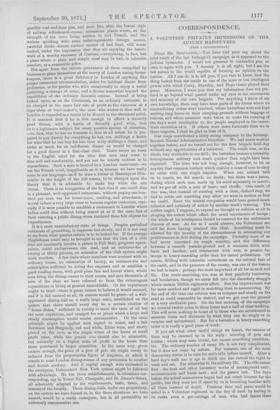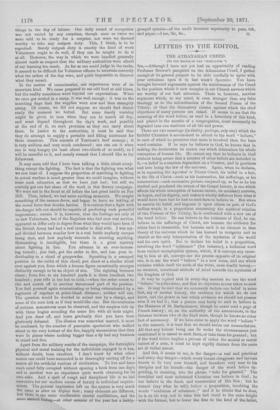CORRESPONDENCE,
waiters speaking with some indistinguishable foreign accent, A VOLUNTEER PRIVATE'S IMPRESSIONS OF THE
[FROM A CORIllitirONDENT.]
work of a worthy successor of Careme,—everything, in fact, but DEAR Mn. SPECTATOR,-YOU have had your say about the
a place where a plain and simple meal may be had, iu tolerable total result of the last fortnight's campaign as it appeared to the comfort, at a reasonable price. judicial bystander. I would not presume to contradict you, or
But apart from the serious grievances of those compelled by even to agree with you. I daresay it is all right, but I am the business to place themselves at the mercy of London eating-house- last person in the world capable of forming an opinion on the keepers, there is a great deficiency in London of anything like matter. All I can do is to tell you, if you care to know, how the proper restaurant accommodatiou, either for habitual diners from thing looked from the inside to one of the more or less intelligent preference, or for parties who wish occasionally to enjoy a social pawns with which Carey, Staveley, and Hope Grant played their gathering, a change of scone, and a dinner somewhat beyond the game. Moreover, I warn you that my information does not pre- capabilities of the ordinary domestic coigne. Instead of being tend to go beyond what passed under my eyes in the movements looked upon, as on the Continent, as an ordinary customer, to and economy of our own brigade. For anything I know of my be charged at the same fair rate of profit as the customer at a own knowledge, there may have been parts of the forces where no cigar-shop or boot-maker's, the man who wishes to dine well in contradictory orders were received, where battalions were not kept Loudon is regarded as a victim to be fleeced to the uttermost point. waiting long hours on their camping-grounds without baggage or It is assumed that if ho is rich enough to afford a decently rations, and where measures were taken to make the meaning of good dinner, with a bottle of decently good wine, that the day's work intelligible to the people employed in the imme- he is a legitimate subject for every possible species of extortion, diato execution of it. If others were more fortunate than we in —in fact, that he has no business to dine at all unless he is pro- these respects, I shall be glad to hear of it. things in the day of leisure. Our daily round of occupation was not varied by any surprises, though once or twice we were told to be ready for a surprise, nor were we deemed worthy to take any outpost duty. This, I think, is to be regretted. Surely outpost duty is exactly the kind of work Volunteers ought to do well, if they can be taught to do it at all. However, the way in which we wero handled generally almost made us suspect that the military authorities were afraid of our learning too much. As far as one could judge in the ranks, it seemed to be difficult for Volunteer officers to ascertain correctly what the orders of the day were, and quite impossible to discover what they meant.
Iu the matter of commissariat, our experiences were of an uncertain kind. We came prepared to eat odd food at odd times, but the reality sometimes went beyond our expectations. When we once got settled in a camp, it was well enough ; it was on the marching days that the supplies went now and then strangely astray. Of course, we did not suppose we should find dinner ready the moment we halted. But some timely warning might be given to men when they are to march all day, and must depend throughout the day's work, and possibly at the end of it, on each provision as they can carry about them. In justice to the authorities, it must he said that they do attempt to supply a portable and filling nutriment for these occasions. This consists of Yeatman's beef sausage ; it is very uniform and very much condensed ; one can eat it when one is very hungry (at least about two-thirds of us could), so I will be merciful to it, and merely remark that I should like to try Erbswurst.
It may seem odd that I have been talking a little about every- thing except the fighting. The fact is that the fighting was what we saw least of. I suppose the proportion of marching to fighting in actual warfare is much greater than we could imagine, without some such education as that wo have just had ; but still we scarcely got our fair share of the work in this Surrey campaign. We were not in the front at all before the last great battle on Fox Hill. Then, indeed, we had some exciting moments. We caught something of the cannon-fever, and began to have an inkling of the moral force that decides battles. It is curious that a fight with the danger left out should be-capable of producing such powerful impressions ; certain it is, however, that the feelings not only of us raw Volunteers, but of the Regulars who had seen real service, appeared to differ only in degree from what they would have been if the British Army had had a real invader to deal with. I was my- self divided between wonder how in a real battle anybody escapes being shot, and how anybody succeeds in shooting anything. Skirmishing is intelligible, but there is a great mystery
about fighting in line. You advance in an ever-increas- ing tumult ; you halt, got the order to fire, and lose your in- dividuality in a cloud of gunpowder. Squatting in a cramped position in the midst of this cloud, you shoot at a similar cloud over against you, from which a human figure occasionally emerges distinctly enough to be an object of aim. The sighting becomes closer ; from five to six hundred yards it is three hundred, two hundred ; your rifle is too hot to hold,—when the order comes to rise and march off to another threatened part of the position. You find yourself again exterminating or being exterminated by a regiment of regulars at point-blank distance ; neither will stir. The question would be decided in actual war by a charge, and some of the men look as if they would like ono. But the courtesies of autumn manoeuvres must be observed, and the umpires ride up with three bugles sounding the cease fire with all their might. And you draw off, and learn gradually that you have been gloriously defeated. The illusion was somewhat marred, it must be confessed, by the number of peaceable spectators who walked about in the very hottest of the fire, happily unconscious that they were in places where nothing bigger than a fly had any business to stand and live.
Apart from the military results of the campaign, the fortnight's physical and moral training for the individuals engaged in it has, without doubt, been excellent. I don't know by what other means one could have succeeded in so thoroughly casting off for a season all the artificial vanities of civilization. To live and have one's mind fully occupied without opening a hook from one day's end to another was an experience quite worth obtaining for its own sake. And a spell of rough and disciplined life is no bad corrective for our modern, excess of luxury in individual require- ments. The general impression left on the system is very much the same as after an Alpine tour ; many elements are different, but there is the same comfortable mental equilibrium, and the same assured feeling—at other seasons of the year but a feebly-
grasped opinion—of the soul's immense superiority to pens, ink, and paper.—I am, Sir, &o.,































 Previous page
Previous page